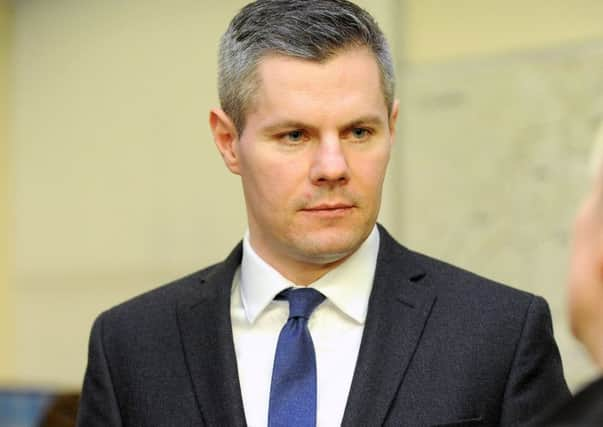Scotland's Budget: Middle class hit by SNP-Greens deal


In return for Green support, finance secretary Derek Mackay agreed to impose a more punitive tax regime on higher earners than had been previously proposed and pledged £160 million extra spending for local authorities.
MSPs voted narrowly to support Stage 1 of Mr Mackay’s Budget Bill when the SNP and Greens combined to defeat opposition from the Conservatives, Labour and the Liberal Democrats by 67 votes to 59.
Advertisement
Hide AdAdvertisement
Hide AdMr Mackay claimed his financial package for 2017-18 would “support jobs” and encourage future growth.
But the finance secretary and Green co-convener Patrick Harvie faced attacks from opposite ends of the chamber.
The Conservatives denounced the Budget for lurching to the left and making Scotland the highest taxed part of the UK, while Labour argued that the tax changes were not radical enough to mitigate the cuts coming to public services.
During a fiery debate, the Conservative finance spokesman Murdo Fraser attacked Mr Mackay for working with the Greens to produce a “hard left”, “anti-growth” and “anti-business” agenda.
“What a pity, what a tragedy for Scotland that he [Mackay] chose to throw in his lot with the lentil-munching, sandal wearing watermelons on that side of the chamber,” Mr Fraser said.
“The Nationalists have shown contempt for the views of Scottish business, and have demonstrated they have zero interest in trying to help grow our under-performing economy. This is a weak, hesitant and dismal set of measures.”
Before yesterday’s Budget debate, Mr Mackay had already signalled that Scotland would become the highest taxed part of the UK when he ruled out passing on a tax break promised by the UK government.
Mr Mackay refused to implement Chancellor Philip Hammond’s proposal to raise the 40p threshold from £43,000 to £45,000 this year. His original plan was for the threshold to rise in line with inflation to £43,430.
Advertisement
Hide AdAdvertisement
Hide AdNeeding the help of the six Green MSPs, Mr Mackay instead said the 40p threshold would be frozen at £43,000 in Scotland. The move will affect around 372,000 Scottish taxpayers –the equivalent of 10 per cent of the workforce.
Mr Mackay’s original plan to move the threshold with inflation would have resulted in those affected paying £314 more per year than those south of the Border. Keeping the 40p threshold at £43,000 increases the difference between the amount of tax paid north and south of the Border by those affected to £400.
Mr Mackay argued that those covered by the changes would have to pay around £7.70 extra a week compared with those in the rest of the UK – “less than the cost of a single prescription in England”.
The £29 million raised by the income tax changes would go towards local authorities along with a further £30m from capital funding and £100m of resource funding.
In addition, Mr Mackay announced a further £25m for police reform, and an extra £35m for Scottish Enterprise.
Labour had argued for a more radical tax plan calling for an extra 1p to be put on income tax across all bands.
Scottish Labour leader Kezia Dugdale criticised the Greens for not holding out for greater tax rises.
Advertisement
Hide AdAdvertisement
Hide AdShe also accused Mr Harvie’s party of supporting the SNP in order to prevent a snap election ahead of a second independence vote.
Labour argued that despite Mr Mackay’s pledges councils still faced a £169m cut.
Ms Dugdale said: “To accept anything less than bold use of this parliament’s tax powers is an astonishing and deeply disappointing revelation from the Greens.
“This isn’t the Greens’ responsibility to parliament shining through, it’s the responsibility they have put on themselves to do nothing which might jeopardise the prospect of another divisive independence referendum.”
Mr Harvie said the Greens had delivered “the biggest Budget compromise” in devolved history.
But he added: “I am very clear that the Scottish Government has given far less ground than I think they should, far less ground than I think they could on taxation.
“The reality though is £160m additional [funding] going into the unringfenced local government allocation.”